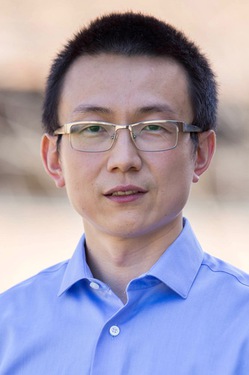
- This event has passed.
MSE Seminar: “Predicting Properties of Structurally and Chemically Complex Materials using Physics-informed Statistical Learning”
October 1, 2020 at 10:45 AM - 11:45 AM
To apply statistics and data science tools to aid computational designs of materials is under fast development. There are two unique aspects of the applications of these tools in materials science. First, the training sets are usually small. Second, physical mechanisms of material properties can be applied to facilitate the constructions of descriptors and statistics learning methods. In this talk, I will give three examples to address these two issues. The first example is to use machine learning to predict density and elastic moduli of SiO2-based glasses. Our machine learning approach relies on a training set generated by high-throughput atomistic simulations and a set of elaborately constructed descriptors with the fundamental physics of interatomic bonding. The predictions of our model are comprehensively compared and validated with a large amount of both simulation and experimental data. In the second example, a general linear correlation can be found between two descriptors of local electronic structures at defects in pure metals and the solute-defect interaction energies in binary alloys of refractory metals with transition-metal substitutional solutes. This linear correlation plus a residual-corrected regression model provides quantitative and efficient predictions on the solute-defect interactions in alloys. In addition, with these local/global electronic descriptors and a simple bond-counting model, we developed regression models to accurately and efficiently predict the unstable stacking fault energy (γusf) and surface energy (γsurf) for refractory multicomponent alloys. Using the regression models, we performed a systematic screening of γusf, γsurf, and their ratio in the high-order multicomponent systems to search for alloy candidates that may have enhanced strength-ductile synergies. First-principles calculations also confirmed search results.

Liang Qi, University of Michigan
Assistant Professor of Materials Science and Engineering
Dr. Liang Qi is an assistant professor in Department of Materials Science and Engineering at University of Michigan, Ann Arbor starting from 2015. He studied Materials Science and Engineering at Tsinghua University in China and got his bachelor’s degree in 2003. He earned his master’s degree in Department of Materials Science and Engineering at the Ohio State University in 2007 and his doctoral degree in materials science and engineering at University of Pennsylvania in 2009. From 2009 to 2012, he worked as a postdoctoral research fellow at UPenn and Massachusetts Institute of Technology. Between 2012 and 2014, he worked as an assistant project scientist at University of California, Berkeley. His research fields are investigations of the mechanical and chemical properties of materials by applying theoretical and computational tools, including first-principles calculations, atomistic simulations, multiscale modeling and machine learning. He received the NSF CAREER award in 2019.
